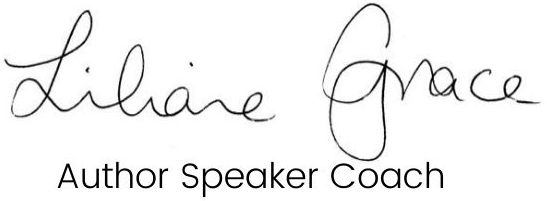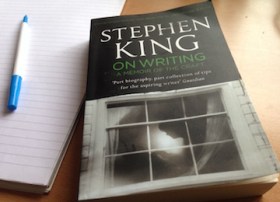 I haven’t read any Stephen King books because I’m not into the thriller/horror/mystery genre, but I decided I wanted to read his On Writing, and I’m really enjoying it. The man values the literary arts more than I had expected. His turn of phrase is entertaining and delightful. I particularly love his humility in sharing an excerpt of his own work, unedited and then rewritten, for the reader to see how he goes about the process of refining his work.
I haven’t read any Stephen King books because I’m not into the thriller/horror/mystery genre, but I decided I wanted to read his On Writing, and I’m really enjoying it. The man values the literary arts more than I had expected. His turn of phrase is entertaining and delightful. I particularly love his humility in sharing an excerpt of his own work, unedited and then rewritten, for the reader to see how he goes about the process of refining his work.
But when he gets to the heart of his book and states that while he believes an incompetent writer can become competent, a good writer can never be great, I cannot agree.
To begin with, there is no such thing as an absolute standard of ‘great’ that all readers around the world hold to. There are plenty of ‘great’ books that leave me cold, while others make me laugh, cry, or ponder; the number of famous, best-selling and classic authors who were rejected, often rudely and often for a long period of time before making their mark, is significant, suggesting that there is not widespread agreement about what makes writing ‘great’.
I’ve often shared a story with my writing students about the time I attended a panel discussion at the Writers Victoria Centre in Melbourne. The panel consisted of a publisher, a literary agent and another ‘expert’. One of the audience asked the question, ‘How do you know when you’ve come across a great work?’ or something to that effect, and the publisher answered it by saying, ‘I get a tingle down my spine.’
How ridiculous, I thought. How utterly absurd!
If a ‘tingle down the spine’ were an objective measure of good writing, what happened to the tingle in the countless number of publishers who rejected JK Rowling, Dr Seuss, John Grisham, Ann Frank, Rudyard Kipling, Richard Bach, Judy Blume, ee cummings, Gertrude Stein, Meg Cabot, Zane Grey, Pearl Buck, Richard Hooker, Robert Pirsig, Jack Canfield and Mark Victor Hanson, William Saroyan, William Golding, John le Carré, Joseph Heller, Ursula Le Guin, George Orwell, William Faulkner, Vladimir Nobokov, Sylvia Plath, Irving Stone, Frank Herbert, Richard Adams, Madeleine L’Engle, Jack Kerouac, Margaret Mitchell, Kenneth Grahame, Isaac Beshavis Singer, Marcel Proust, Jasper Forde, Thor Heyderdahl, Jorge Luis Borges, DH Lawrence – and even Stephen King himself?
There is no such thing as an objective measure of good writing. That publisher was talking about what gives HER a tingle down the spine – what inspires or touches or excites her. It’s not necessarily going to be the same for other publishers or for the worldwide readership.
This doesn’t meant that there can’t be agreement among writing experts about what constitutes skilful writing – there absolutely is; what it does mean is that our response to writing is largely subjective because we bring our individual selves to what we read.
You can give a roomful of writers the exact same topic and they will each come back with a unique story because each person will draw out associations to that topic that emerge from their own life experiences, interests, meanings, and so on; likewise, each reader responds differently to the same work. Many people read horror and thrillers with delight; I’m turned off, no matter how well it is written. I love a story that explores the depth of ordinary human relationships and doesn’t need to include murders or sex crimes or other dramatic experiences; others are turned off by those simple tales.
I’m often discouraged by the books I read on occasion that I consider to be very badly written but nevertheless achieve vast sales and popularity. But do we define a ‘great’ author merely as someone with great literary ability or as someone who touches vast numbers of people? Perhaps it’s snobbish to set the bar at ‘literary mastery’ and ignore the millions of readers who resonate with something else.
Harry Potter is a case in point. Stephen King agrees with the literary experts that one should avoid adverbs, especially attribution in speech. You don’t need ‘firmly’ in ‘‘I disagree,’ he said firmly’. The speech and context should do the job. Adverbs of that ‘ly’ sort are the props of a weak writer. In general, I agree. At the back of his book he lists his favourite reading or books that have been influential. The list includes the Harry Potter books, all of which include ‘ly’ adverbs with merry frequency. I opened Harry Potter and the Chamber of Secrets at random and found four on pages 96-97.
Is JK a literary author? No. Is she a great author? Without a doubt, yes. The response to her books confirms that she has struck a note in people around the world; she provides something that vast numbers of people want.
There’s another reason for my disagreement with Stephen King’s statement that it’s impossible to turn a good author into a great one and that is that talent is not a gift of the gods. Becoming a great author is not down to luck or talent; we can actually engineer it ourselves.
If it’s possible for all the athletes and artists and musicians and inventors and actors and public figures to rise from the ‘reject’ list and become the most loved, most able, most renowned, it’s possible for anyone in any field. TALENT, the way I teach it, is an acronym for Time, Application, Love – Energy Not Talent.
With enough love and dedication and application, over time the skills can be developed/honed. Human performance studies confirm this. Just ask Anthony Robbins, the inspirational leader in the field of behavioural change.
When I first began to dance I was told that my ‘head wasn’t connected to the rest of my body’. I was stiff and awkward. Now, after some 25 years dancing weekly – no training, just socially – I’m often congratulated on my dancing ability. I have learnt to feel the pulse of the dance; I have a sensitivity to my partner’s movements. Talent, whether writing or dancing or basketball or any other sort, does not come down to luck; it comes with much practice.
If you’re thinking about those children with startling abilities, go and check their stories more closely. You might find that even they have already put the hours in. This is the contention of Anders Ericsson, a world expert on ‘deliberate practice’, who doubts that any such thing as talent actually exists. A number of experts point out that even Mozart had already been playing music some 3,500 hours by the age of six when he first began to compose. Young Norwegian Angelina Jordan, who blew me away with her mature singing at age six or seven, had also been exposed to jazz from the time she was a baby, and had been singing along since she was two. (For more on this, see the chapter on ‘Culture’ in The Social Animal – A Story of How Success Happens by David Brooks.)
I teach my students strategies that will produce reliably good writing every single time whether you have so-called writing ability or not. It is not a question of luck or talent; it’s a question of love and application. If you love the art and keep at it and learn from great writers – those you believe are great – you will surely improve.
The challenge is managing our emotional response to the time-lag between writing our loved work and connecting with the readership that will love our work. Sometimes that never happens. Some of us paper our toilets with rejection letters and eventually give up; others receive as many or more rejection letters and then are ‘discovered’.
The real difference between the good writer and the great writer is in their ability to persist.


Recent Comments